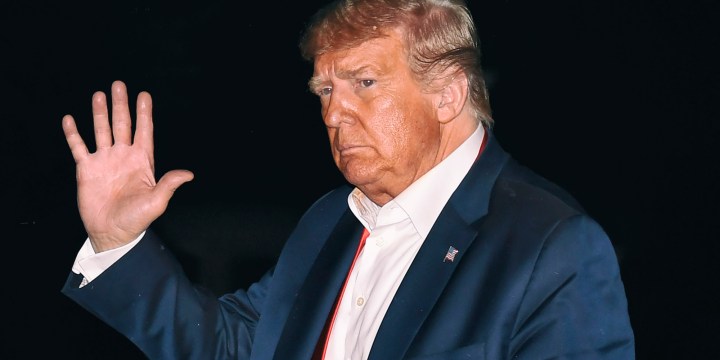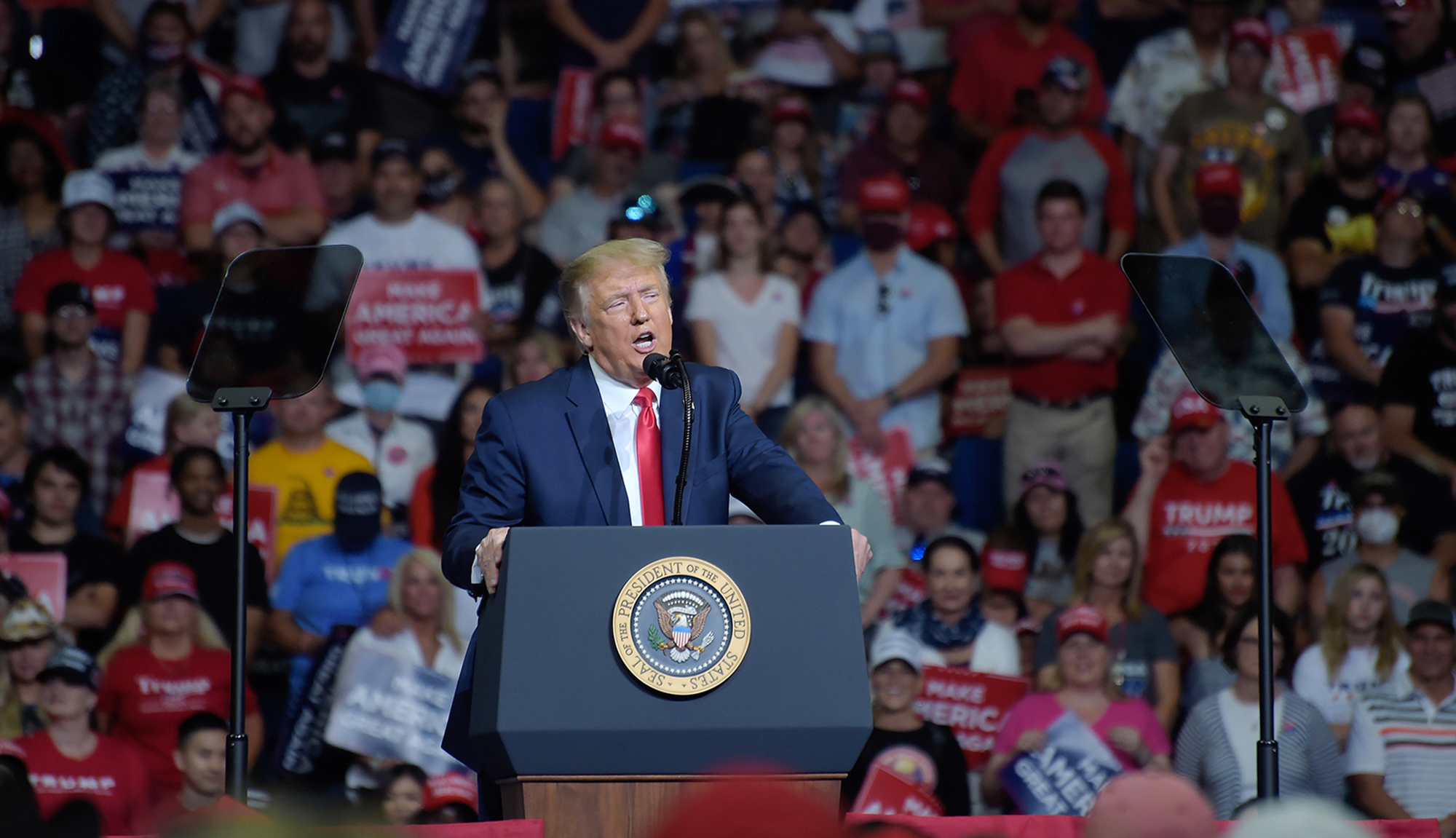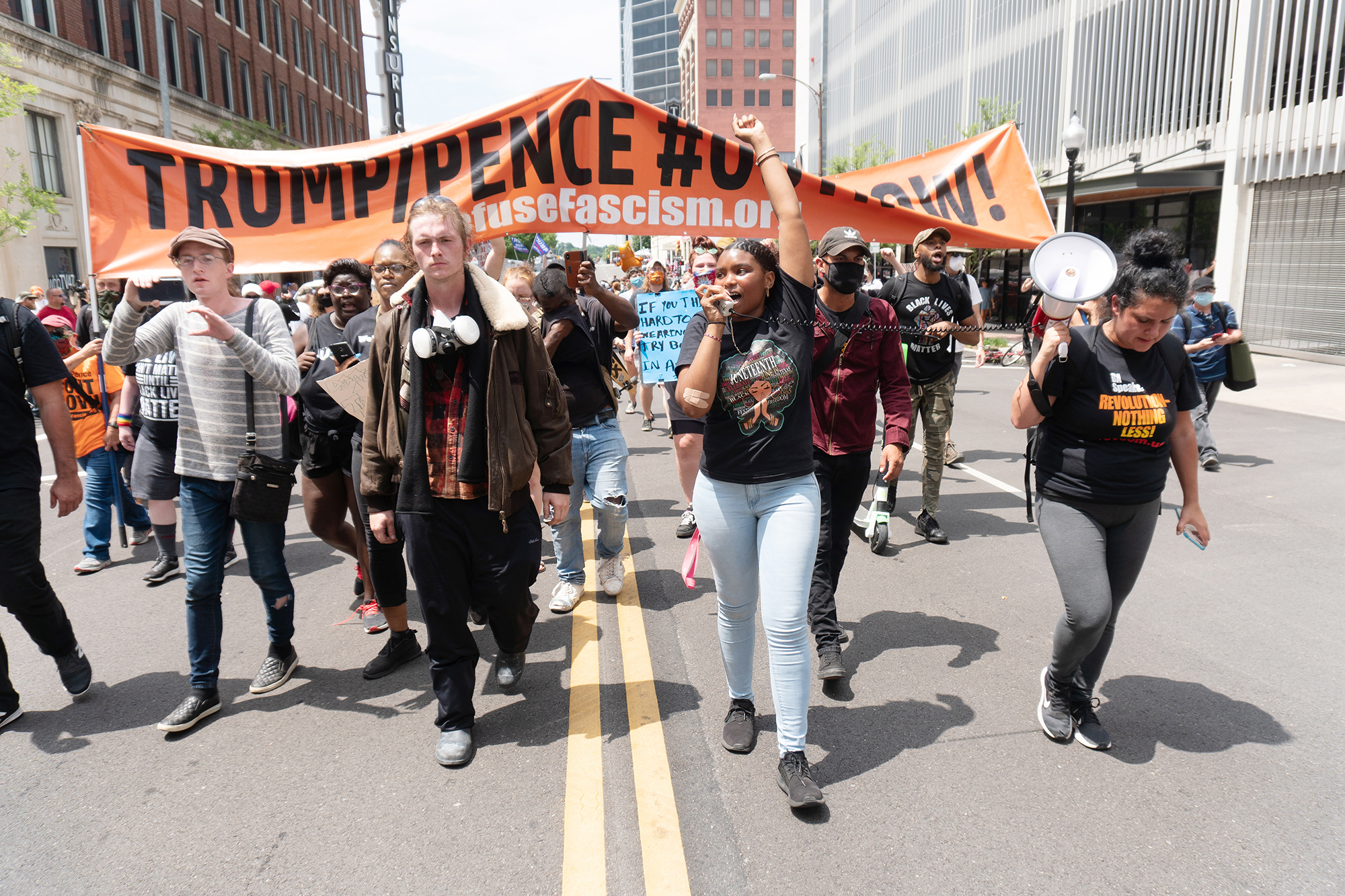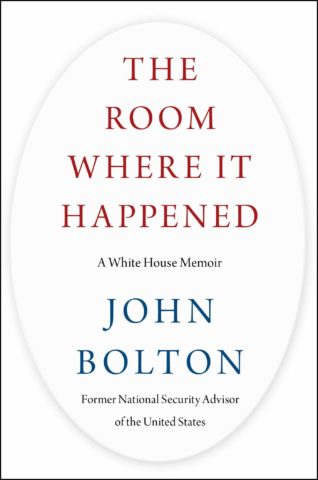AMERICA NOW
As 2020 nears halfway mark, Trump presides over a country in worst turmoil since 1968

This past week has been one that can hurt deeply if one is looking for an America determined to re-establish a real sense of balance. But look deep enough, here and there, and there are occasional green shoots of progress, even if they remain hard to find. Still, watching a Donald Trump campaign rally can be a trial and a torment.
If anybody had predicted, just half a year ago, the state of American political life would be as we now see it, such a fortune teller would have been laughed at as the worst palm reader, crystal ball reader, ouija board user of all time. Such a prediction would have been worse than the one that came from the scientist who — right at the end of the 19th century — had recommended closing the patent office because everything useful had already been invented and so the government should just save the money.
In purely political terms, this year has been totally, completely, uniquely sui generis. In comparison, for the usual modern American political calendar in an election year, at least for the party out of power, the primary season gets increasingly combative until a front runner finally emerges and then it is all hands on deck to unseat the incumbent party in power. This has largely been true even when significant intra-party opposition to the front runner and eventual putative nominee remains, right up to the moment of the final vote at the national nominating convention. (In years where the party holding the presidency has a president who will have had two terms of office, because of a constitutional prohibition of more than two terms of office, the party in power can also have a contentious primary season too.)
But because of the Covid-19 pandemic, the usually rowdy Democratic Party’s nomination contest suddenly came to a strange anticlimax. Following former Vice President Joe Biden’s wins in several multi-state primary days against his chief opponent, Vermont Senator Bernie Sanders, the air increasingly went out of the Sanders insurgency just as state-by-state stay-in-place shutdowns were kicking in, making it nearly impossible to campaign in the usual fashion. This helped let the air out of the Sanders balloon, even in the face of fervent enthusiasm by his supporters. That took the heart out of any real possibility of a winning insurgent Sanders candidacy — or any from any other candidate — in place of Biden. In fact, endorsements by a number of leading black Democrats as well as Biden’s deep veins of support among African Americans and older voters proved telling in the end.
Surprisingly, the remaining primaries have proved to be kind of an afterthought or even a rubber stamp, after every other would-be nominee decided to endorse Biden publicly. For several of the other candidates, those endorsements might have been an agile way to position themselves as potential vice presidential nominees. For others, it was a recognition that any further infighting among Democrats was only going to help the chances of Donald Trump’s re-election. Yet for others, it was a recognition that their campaigns had simply run out of cash and so it would be better to stay inside the party’s tent and try to influence party platform provisions than keep fighting in a definitively losing battle. For this latter rationale, read the name Sanders of course.
But the Trump re-election machine, despite having amassed an astounding hoard of cash for the upcoming campaign, has found itself bound, hand and foot, by the Covid-19 virus, with the only real possibilities for using this mountain of money being the online world. The strong suit of the monster rallies he so loves — something like a Trumpian version of a Nuremberg rally — has been out of bounds as well for the past three months.

US President Donald Trump speaks during his rally inside the Bank of Oklahoma Center in Tulsa, Oklahoma, US, 20 June 2020. (Photo: EPA-EFE / Albert Halim)
This past weekend, however, the Trump campaign finally put the machinery in motion in Tulsa, Oklahoma for one of his monster rallies on 19 June 2020. According to Trump campaign sources, something like a million people had registered for the event and around 20,000 people were supposed to attend inside the Bok Center in Tulsa, while many thousands more were supposed to cluster together just outside the venue.
While the campaign said it was going to hand out hand sanitiser and face masks in deference to the realities of the still-pervasive pandemic, virtually every public health specialist in and out of government weighed in to call such an event a kind of giant petri dish to hot-house a new round of Covid-19 infections — and then vectors the infected clear across the nation as attendees return to their homes around the US.

Protesters march outside the security fence surrounding the Bank of Oklahoma Center hours before President Donald Trump’s rally in Tulsa. (Photo: EPA-EFE / Young G Kim)

Protesters face off with Oklahoma State Troopers outside the security fence surrounding the Bank of Oklahoma Center hours before President Donal Trump holds a rally in Tulsa, Oklahoma. (Photo: EPA-EFE / Young G Kim)
Oklahoma, itself, meanwhile, was, in the face of a rollback of much of the earlier shutdown, and was already registering a major spike in Covid-19 exposure. Even without the spike that will eventuate from Trump’s rally, the actual infection rate and severe cases in Oklahoma are almost certain to rise. A real question, of course, will be how the blame for this rise will then be apportioned several weeks after the rally, once the number of cases becomes clearer. Nationally, by the actual day of Trump’s rally, the national death toll had already reached nearly 120,000 people, while the total case number was more than 2.25 million — and rising.
Meanwhile, of course, the Trump campaign, and the candidate, ran into yet another provocative angle emanating from the still-ongoing protests and demonstrations stemming from the anger about the killing of George Floyd by a Minneapolis policeman. Such specific protests have merged with the anger and enthusiasm of the “Black Lives Matter” movement. And that stream, in turn, has now come together with calls for reform of policing and still wider protests over racial injustice — both nationally and internationally.
As things would have it, the Trump team managed to stumble over not one but two radioactive boulders by picking Tulsa for their rally on 19 June 2020. These were, of course, in addition to the campaign’s more obvious cocking a snook at efforts to cope with the viral infection.
In an obliviousness to virtually every aspect of African American life and history (and thus black voters as well), the Trump campaign managed to stumble over the fact that they had scheduled their rally for Tulsa – the scene of the deliberate destruction of the city’s Greenwood neighbourhood, the so-called “Black Wall Street”, 99 years ago on 31 May 1921, as white residents burned down virtually the entire district, killing many of the inhabitants in the melee, and rendering the inhabitants destitute.
But if that were not enough, they scheduled the rally on the same day as the historic Juneteenth anniversary. Juneteenth is the date of the final, conclusive end to slavery in America, when federal troops finally reached Galveston, Texas and formally announced the end of slavery, fulfilling the promise of President Abraham Lincoln’s “Emancipation Proclamation” that had been issued at the beginning of 1862. While the proclamation was a statement of intent, the Civil War still had three-and-a-half years to run before emancipation from slavery were more than words for most. The antagonism over picking this date has brought attention to these two anniversaries and, besides everything else, it has given some heft to the burgeoning call to make Juneteenth a national holiday.
Given Trump’s words and deeds to date, on the part of many, perhaps most, black Americans (and many whites as well) it was something of a sacrilege about the meaning of the Juneteenth commemoration to pick that date for the reboot of the Trump monster rally season. In discussing the choice of venue and date, Trump had inevitably added insult to injury when he explained nobody he knew had even mentioned to him the meaning of Juneteenth, and he had never heard about it before anyway. Therefore it didn’t matter. And besides, he’s been the best president ever for minorities because of the brilliant economy he had built all by himself, that is, at least until that evil Chinese virus had so spoiled things for everybody with economic growth and the stock markets.
So, under public pressure, the Trump team changed the date of the rally to one day later than Juneteenth, to 20 June, to make everything all better. There. Everyone happy now? Maybe not quite. And just to make sure he was seen as decisive and powerful, the president unleashed a tweet or two to threaten fire and brimstone on any “Antifa”, rioters, agents provocateur, thugs or leftist lowlifes who tried to make his first real campaign rally in months any sort of battlefield.
But even before the rally in Tulsa, the Trump universe had been rattled by several other events, besides the virus and the ongoing economic disaster that continues to inflict pain on millions. John Bolton, his former national security adviser (technically the third national security advisor after Trump had already fired his first two appointees to that key job), and his publisher were poised to launch his slash and burn memoir depicting Bolton’s close to two years in that job on 23 June 2020.

Former national security adviser John Bolton’s memoir of his time at the White House.
Bolton — or at least the juicy bits of his book — has become the most unlikely possible hero of everybody who opposes the incumbent president’s lamentable presence in the White House. For decades, Bolton has been a hard-edged, hard-boiled, right-wing security policy figure in Washington posts and at the US Mission to the UN, as a commentator on satellite news channels, and as a reliable militaristic policy advocate in the opinion pages of many newspapers.
Over the years, Bolton has honed his reputation as a hard-liner on North Korea, on Iran, on Iraq, on Afghanistan, on Russia, on China, on Syria and on Ruritania (well, okay, not on Ruritania since it doesn’t really exist, except in a novel and a film or two). Throughout the years, Bolton has achieved a well-earned reputation as a razor-sharp-elbowed bureaucratic infighter, even if his policy prescriptions have not always been accepted.
In his new memoir, Bolton largely confirms — and extends — the view of a range of other former aides kicked to the curb, that the incumbent president has little knowledge of the international environment, history, contemporary events, or even basic geography.
Among the nuggets in his book are revelations that Trump did not know Britain had a nuclear arsenal, that Finland was not part of Russia and that Venezuela was not American territory. But most terrifying have been revelations that the president promised to end the investigations into a Turkish bank to please the Turkish president and that he had begged the Chinese leader, Xi Jinping, to reach an agreement on agricultural trade issues so as to assist him, Trump, in his bid for re-election.
The Bolton case is that practically everything Trump has done or is doing is entirely dedicated to achieving personal political benefit for himself, rather than in the broader national interest.
Just by the way, if anybody else had ever done something like that in American political life and history, that person would instantly have been branded as having committed “real high crimes and misdemeanours”. That is, of course, if what Bolton has written is true. Not surprisingly, the Trump administration has already acted against the book on two fronts — charging on the one hand that the book is filled with lies and worse, and on the other that it is going to reveal highly classified information and material. (Is there such a thing as the classification of lies or a penalty for revealing untruths?)
Literary criticism of the book has been withering, but those nuggets are impossible to ignore. Still, a critique of Bolton’s behaviour in all this is growing as well. With all these charges against Bolton’s former boss, why didn’t Bolton offer to testify during the presidential impeachment inquiry or the subsequent trial in the Senate? Bolton’s response has been that the investigation had hamstrung itself by effectively being limited to the accusations over that full-court press on the new Ukrainian president to find and reveal dirt on Biden’s son or say goodbye to any prayer of foreign security assistance from the US. Or, perhaps, Bolton was mesmerised by the very large advance from his publisher, presumably based on the monetisation of Bolton’s scoops rather than rehashes of stuff already dished in testimony. There are apparently no angels in purgatory.
Meanwhile, the Supreme Court has also dealt the Trump administration two back-to-back defeats, one on a LGBTQIA+ discrimination case and the other with a decision that shredded one of the fondest hopes of the Trump administration — getting rid of policies that continued to allow the DACA children to remain in the US. Those children were individuals who had entered the US illegally as small children while accompanying a parent or parents, but who had subsequently gone on to do well in school, go to universities or join the military, get jobs and generally behave like the citizens they had hoped to become. Salt in an open wound in this case was the fact Neil Gorsuch, a justice appointed by Trump and a well-known conservative jurist, had written the opinion on the LGBTQIA+ case that went up against the administration’s hopes.
And then on Friday evening, the attorney general, Bill Barr, announced the resignation of the US Attorney for the Southern District of New York, Geoffrey Berman, except that Berman counter-announced that he wasn’t going anywhere until a duly nominated and confirmed by the Senate replacement was on-hand. Berman, not surprisingly, has been a thorn in the side of the Trump administration and the president specifically, investigating such people as presidential personal attorneys Michael Cohen, and Rudi Giuliani and his rather shady Ukrainian-American associates, among other high profile cases. Eventually, Trump fired Berman directly, although he muddied the waters by announcing that he hadn’t been involved in any of this, since Berman was Barr’s problem.
But the big news for the week was certainly the rally in Tulsa itself. There had been the hyperbolic rhetoric that this rally was to be the real restart of the massive campaign. A million or so people had registered to attend, and that they were going to fill the 20,000 seat amphitheatre, but many thousands more would fill an outdoor overflow area with Jumbotron televisions and a stage for remarks by the president and vice president. In the actual event, only around 10,000 showed up in the building, there were no crowds outside and the initial presidential remarks were unceremoniously cancelled. True to form, the president blamed vast crowds of invisible left-wing thugs and the evil media for chasing away the faithful.
The speech itself was a two-hour marathon of rambling, nearly incoherent explanations of his experiences at the graduation speech at West Point; why testing for Covid-19 is happening too often thereby giving the US a bad score on infections; how a foolish, febrile Biden was in thrall to a vicious, far-left cabal who want to destroy America and deliver shared poverty and want; and how the Trump administration will deliver the economy he has promised yet again, to benefit everyone. There was much more, but, frankly, this writer was too overwhelmed by the torrent of lies, innuendo, misrepresentation and outright fabrications to keep score.
…with the country divided as it is, the most important polling efforts to divine the future will be those that hone in closely on the race in a handful of swing states like Wisconsin, Michigan, Pennsylvania, Ohio and Florida, rather than simply piling up votes in states certain to go to one or another candidate. This is a function of the fact that the American presidency is decided on winning the electoral weight of each of the 50 states, rather than through a single national direct vote.
What is undeniably true, however, is that this was a speech thrown together to appeal to the president’s base and with absolutely nothing in it to build outward to the rest of the nation. There was little or nothing to speak to the current discontents; little reassurance that the government’s policies are sturdy and robust in dealing with the disease; or that the economy will improve through well-thought-through, effectively implemented measures. In short, nothing about it was designed to bring the nation into his embrace and to give citizens confidence adults were in charge. It was an opportunity squandered and frittered away.
Of course, all of this has been taking place in a political universe where Biden, the presumptive Democratic nominee, is running nearly 10 points ahead of the incumbent president in national polling, even before the Democrats have effectively begun to campaign. Yes, it is still early days, and much can happen in the next nearly five months. Yes, too, Biden has his flaws and weaknesses, and it is certain we will hear them repeated ad infinitum by the Trump propagandists — the true ones as well as the ones manufactured by the Trump camp and any friendly bots based abroad.
But we will also have a chance, going forward, to hear Biden’s vision about healing a fractured nation. Historically, most people only really focus on the election after the end-of-summer holiday of Labor Day. In the next two months of summer, the Biden campaign and his surrogates will need to sharpen a message that is inclusive rather than divisive.
Moreover, with the country divided as it is, the most important polling efforts to divine the future will be those that hone in closely on the race in a handful of swing states like Wisconsin, Michigan, Pennsylvania, Ohio and Florida, rather than simply piling up votes in states certain to go to one or another candidate. This is a function of the fact that the American presidency is decided on winning the electoral weight of each of the 50 states, rather than through a single national direct vote.
It is also true that over the past 50 years, incumbent presidents that are that far behind the challenger at a similar time in the calendar have not been successful in the general election. Instead, successful incumbents aiming for a second term have had support at least at the 47% mark at this point in the cycle.
With this history in mind, it is a reasonable supposition — in line with everything we already know about Trump and now underscored by the contents of Bolton’s tell-all memoir — that every decision made by the president is being done to play the percentages in favour of his re-election, rather than from any sense of setting out a vision of the broader national interest. It will be an increasingly nasty time in American politics, but one must bet on the innate belief on the part of most Americans that core values and national interest matters enough to make a rational determination — at least this time around, anyway. DM

















 Become an Insider
Become an Insider